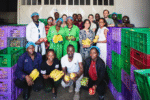The company wants to expand its platform that connects surplus produce with markets. Its goal is to cut down on food waste and make supply chains in Africa more sustainable.
Farm to Feed announced the closing of a $1.5 million seed funding round to support its growth and build a stronger, more sustainable food system as climate change affects the African continent.
Delta40 Venture Studio led the investment round. Other backers included development and investment institutions like DRK Foundation, Catalyst Fund, Holocene, Marula Square, 54Co, Levare Ventures, and Mercy Corps Ventures. The German DEG’s DeveloPPP Ventures program also contributed $230,000 in non-equity funding.
An Innovative Business Model to Combat Food Waste
Founded in 2021 by Claire van Ink (CEO), Anouk Poirtin, and Zara Benosa, the company aims to lower food loss in agricultural supply chains.
The platform features a digital system that connects farmers with surplus or less-than-perfect produce to potential buyers across different sectors. It coordinates supply and demand, improves logistics, and enhances the user experience using data-driven technology.
This model has changed crops that might spoil into a reliable income source for farmers while supporting global efforts to cut emissions from food waste.
Van Ink said, “We are reimagining how we feed the world in a way that is sustainable, renewable, local, and creates real value for farmers, customers, and the climate.”
Regional Expansion and Growing Environmental Impact
Farm to Feed has experienced 100% year-on-year growth. It has connected over 6,500 farmers to its digital platform and sold more than 2.1 million kilograms of agricultural products, helping to avoid 247 tons of CO₂ emissions.
The company will use the new funding to expand its operations in Kenya and explore new regional markets. It plans to further develop its digital platform and improve its semi-processed product line to access higher value-added markets for African farmers.
Van Ink highlighted that technology will stay at the core of the company’s growth, stating, “We aim to build a smart, climate-resilient food supply chain, providing local and global markets with sustainable products that reduce waste and increase economic value.”






